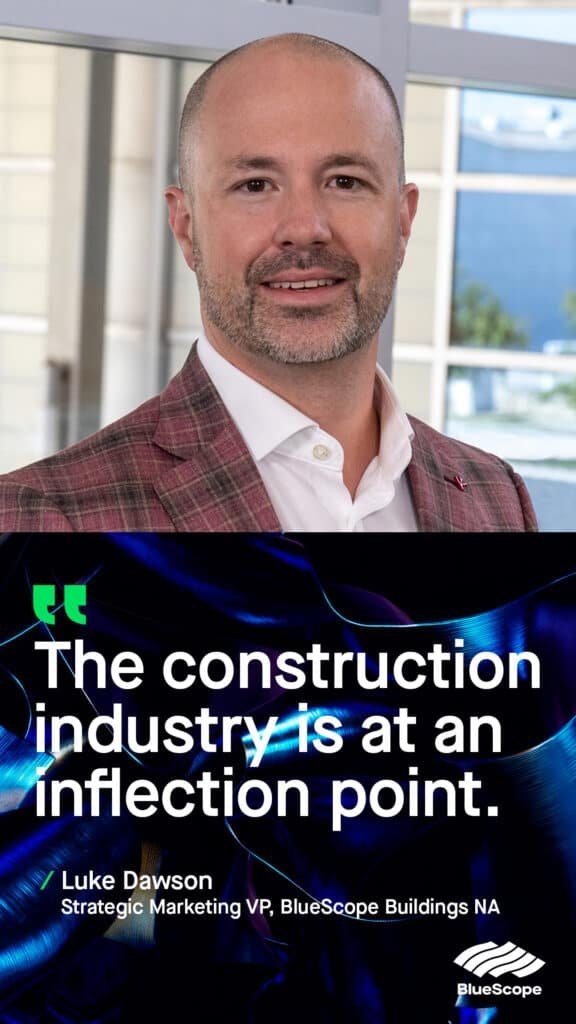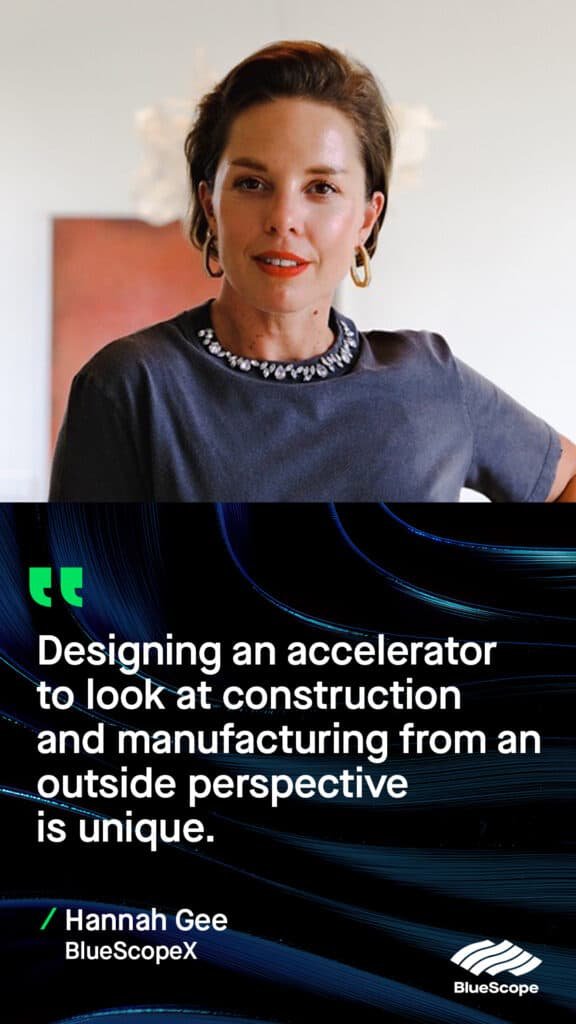Buildings of the Future Accelerator Aims to Revolutionise Industry
Neu21 delivers Buildings of the Future Accelerator that aims to Revolutionise Construction Industry
“The construction industry is at an inflection point,” says Luke Dawson, vice president of strategic marketing for BlueScope Buildings North America, a division of the global steel company, BlueScope Steel Ltd.
“Everything — from the shortage of skilled labor to the impact of digitalization, 3D modeling, and sustainability — has created an urgency to rethink how we design, source, fabricate, erect, and operate buildings. Combined with the traditional drivers of inefficiency, the industry is ripe for disruption.”
Evidence of this problem is easy to find.
While overall the U.S. economy’s productivity rate has doubled in the past 50 years, the construction industry “has diverged considerably, trending downward throughout that period,” reports the University of Chicago.
Construction is also the second least digitalized sector in the country — despite widespread acknowledgment that digital transformation is key to addressing labor and supply chain shortages, reducing carbon emissions, and enabling greater efficiency.
The challenge was, and continues to be, how to apply breakthroughs in other industries to the construction industry.
Why does BlueScope think the time is now?
Dawson points to three primary reasons:
Urgency: Owners are demanding more from an asset that will often last more than 50 years
Technological maturation: Tools that have benefited other industries are sophisticated enough to deliver the same benefits to the construction industry
Willingness: The industry understands it needs to collaborate and embrace solutions from outside the sector to advance.
BlueScope is breaking the cycle.
Together with its venture arm, BlueScopeX, they are launching an accelerator program that invites innovators from outside construction to revolutionize the sector and tackle efficiency and sustainability concerns.
Dubbed “Buildings of the Future,” the accelerator will challenge start-ups, founders, and innovators to build, test, and trial technologies that can help evolve how non-residential buildings are constructed.
At the end, all participants will have the opportunity to showcase and pitch their concept or product to the BlueScopeX venture fund. Additionally, $100,000 USD will be awarded to the overall winner of the program — with no strings attached, and no equity taken.
The accelerator’s end goal: “to make the building industry more productive, adaptable, and sustainable, strengthen communities, and build a better world,” says Dawson.
Inviting the world’s brightest minds to solve macroeconomic construction challenges.
If you’re trying to recall the last time you heard of a construction-focused accelerator, it might take a while. Tech companies tend to dominate accelerator programs, and the building sector isn’t well-known in many start-up spaces.
“Designing an accelerator to look at construction and manufacturing from an outside perspective is a unique approach in the industry,” says BlueScopeX’s Hannah Gee, who is leading the design, development, and delivery of the accelerator program.
“When it comes to research and development (R&D) and university partnerships, for things like safety or compliance ventures, we’re very good, very technical, we really know what we’re doing,” she explains.
“But we want to look at what’s out there in terms of adjacent industries, or even completely different industries, to challenge us to move away from the traditional way of doing things and embrace solutions we haven’t considered.”
There are four broad categories of transformation Buildings of the Future is investing in.
“These four verticals were selected because they really connect to four major macro trends impacting the construction industry and the economy, ” Dawson says. “They’re also all inherently connected to one another.”
Advanced AI robotics and AI applications – Innovative AI and robotics solutions that can automate or bring greater efficiency to the construction process. For example, technology that enables faster production of non-repetitive welded steel products.
Sustainable and smart building solutions – Tools or solutions that support designing and/or building more sustainably. For instance, products or new materials that help reduce the weight of a building, or are easier to deconstruct at the end of the building’s life cycle.
Integrated building solutions – Solutions designed to integrate with other elements of the building process. Think: creating whole new products that combine traditionally separate components, to enable more plug-and-play offsite.
Customer experience solutions – Data, analytics, and visualization tools that can be used end-to-end throughout the building process, to better understand and connect fabricators, builders, owners, and occupiers.
Companies at any stage of development can apply to be part of Buildings of the Future, whether they’re a start-up, already have a prototype, or are ready to scale production, and would benefit from accessing the resources and extensive industry networks BlueScope and BlueScopeX offer.
The six-week program is, by design, fast and intense. Delivered virtually, the program will present four concurrent streams of activities each week that include opportunities to learn from industry experts, mentoring and coaching sessions, as well as networking events.
Participants will then pitch their concepts in person at Massachusetts Institute of Technology (MIT) on June 14, 2023, in collaboration with the MIT Startup Exchange. Applications for Building of the Future are open now and close late April.
This article originally appeared on bluescopebuildings.com


